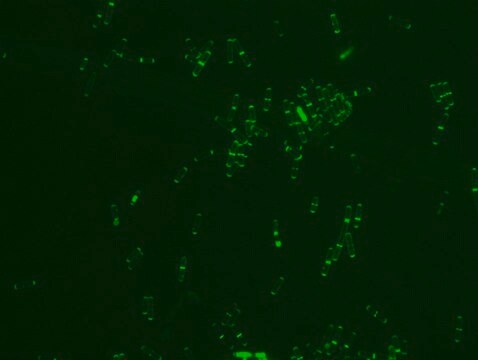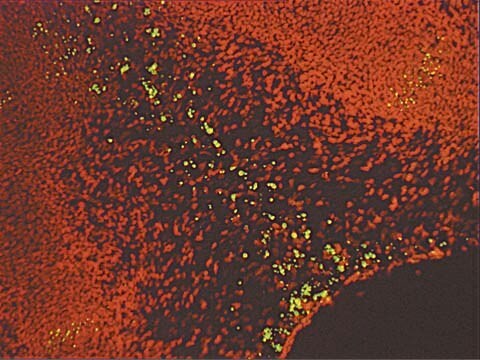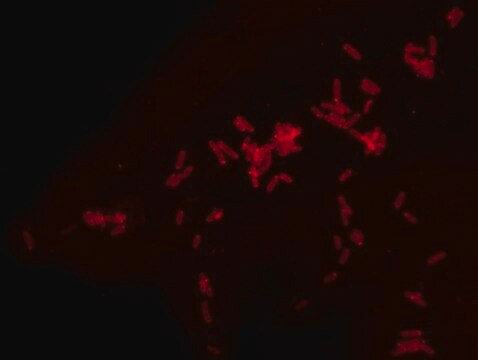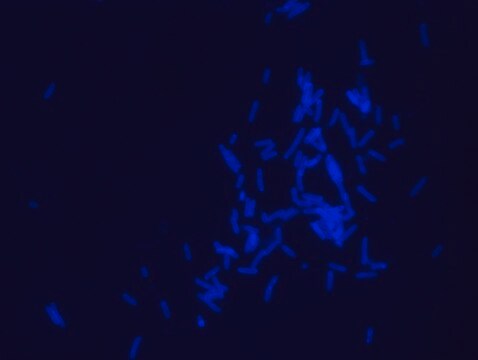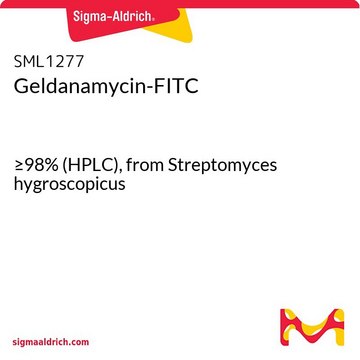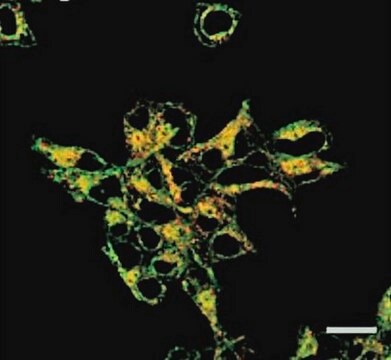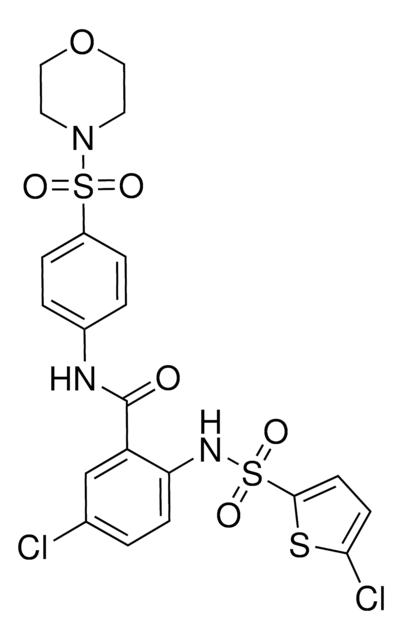SBR00047
Rhodamine B labeled Ramoplanin
For fluorescent microbial imaging
Sign Into View Organizational & Contract Pricing
All Photos(1)
About This Item
Empirical Formula (Hill Notation):
C146H184ClN23O46S2
Molecular Weight:
3096.73
UNSPSC Code:
12352116
NACRES:
NA.76
Recommended Products
General description
Rhodamine B labeled Ramoplanin is a fluorescent derivative of Ramoplanin, with a similar mode of action as Ramoplanin. It allows fluorescent labeling of Gram-positive bacteria and their detection by common fluorescent instruments. Ramoplanin is a lipoglycodepsipeptide antibiotic that is produced by the fermentation of Actinoplanes species. Fluorescent antibiotics are obtained by a synthetic conjugation of an antibiotic to a fluorophore.
Application
Fluorescent antibiotics can be used for many applications including:
- Antimicrobial resistance research
- Bacterial visualization and imaging
- Parent antibiotic mode of action research and new antibiotic discovery
- Toxicity studies
- Diagnosis of bacterial infections and tracking their uptake in vivo
Biochem/physiol Actions
Ramoplanin blocks the bacterial cell wall biosynthesis by specifically binding to the first sugar of lipid I. N-Acetylmuramic acid thus interfering with peptidoglycan production.
Mode of Action: Is different from the d-Ala-d-Ala that are targeted by vancomycin and shows no cross-resistance with other glycopeptides.
Activity Spectrum: Effective against a broad-spectrum activity against Gram-positive pathogens both in vitro and in vivo including Enterococci, Staphylococci, Bacilli, Streptococci, Listeria monocytogenes, and Gram-positive anaerobes such as Clostridrium difficile. However, Rhodamine B labeled Ramoplanin presents a MIC decrease in the magnitude of two to five orders in bacterial activity in comparison to the parent Ramoplanin.
Mode of Action: Is different from the d-Ala-d-Ala that are targeted by vancomycin and shows no cross-resistance with other glycopeptides.
Activity Spectrum: Effective against a broad-spectrum activity against Gram-positive pathogens both in vitro and in vivo including Enterococci, Staphylococci, Bacilli, Streptococci, Listeria monocytogenes, and Gram-positive anaerobes such as Clostridrium difficile. However, Rhodamine B labeled Ramoplanin presents a MIC decrease in the magnitude of two to five orders in bacterial activity in comparison to the parent Ramoplanin.
Features and Benefits
High quality antibiotic suitable for mulitple research applications
Analysis Note
- Fluorescent microscopy application: Rhodamine B labeled Ramoplanin has excitation/emission wavelength range at 550-560 nm/590-600 nm.
- It is recommended to dissolve the Rhodamine B labeled Ramoplanin in DMSO to a concentration of 2 mg/mL.
- The recommended working concentration in fluorescent microscopy imaging application is 10μM. The mentioned concentration was used for Bacillus subtills staining (see image).
- Aliquots of the DMSO solution can be stored at −20 °C, protected from light for at least one month.
Other Notes
For additional information on our range of Biochemicals, please complete this form.
Storage Class Code
11 - Combustible Solids
WGK
WGK 3
Flash Point(F)
Not applicable
Flash Point(C)
Not applicable
Choose from one of the most recent versions:
Certificates of Analysis (COA)
Lot/Batch Number
Sorry, we don't have COAs for this product available online at this time.
If you need assistance, please contact Customer Support.
Already Own This Product?
Find documentation for the products that you have recently purchased in the Document Library.
Our team of scientists has experience in all areas of research including Life Science, Material Science, Chemical Synthesis, Chromatography, Analytical and many others.
Contact Technical Service